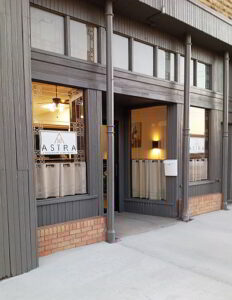Residents Enjoying Clean Water with Completion of First Phase of Project
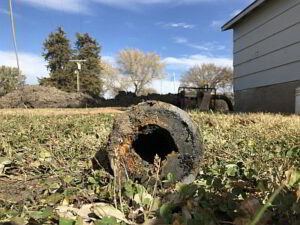
A two-phase project in the City of Vermillion is working to resolve many water issues, including the presence of sludge filled/corroded pipes. (Courtesy Photo)
While many take access to clean water for granted, residents in the small town of Vermillion, Kansas, located in eastern Marshall County, are celebrating the recent connection of a new source of water supply.
The original water source and systems circa 1934 were plagued with increasing concerns in recent years. The City of Vermillion (population 80) had a water well source with high concentrations of iron and manganese. To mitigate the issues, the system was flushed regularly to try to rid it of the odorous colored water. Some residents even adjusted laundry around the flushing schedule to ensure that their white laundry stayed white. More importantly, the water quality was poor and the EPA deemed it unfit for infants to drink.
The city did what it could to maintain and improve the water system and increased water rates incrementally several times. The needs, however, were great. Eventually the city turned to outside funding sources beginning with a USDA SEARCH grant to complete preliminary testing for new well sites. The city then decided to take a two phased approach to address its water needs. For Phase 1, the city was awarded $252,000 through the Small Cities Community Development Block Grant (CDBG) program, which is administered by the Kansas Department of Commerce. The City of Vermillion secured additional funds through a combination of a USDA Rural Development loan of $415,000 and grant of $1,890,000.
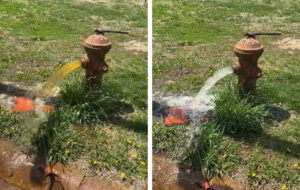
A comparison of water being flushed before (left) the new water source supply and after (right). (Courtesy Photo)
“Improving the water quality is a critical need for a community — and it was impacting Vermillion’s growth overall,” said Amanda Horn, NCRPC Community Development Representative.
A new well has been the primary focus of Phase 1 and the new source of supply is now connected in Vermillion. A new hydracone water tower is nearing completion. This first phase will also include tearing down and disposing of the old water tower.
The NCRPC, with Horn as the project lead, provided planning assistance, grant writing and project administration. Other non-funding key partners involved with the project — all from Kansas — were engineers CES Group, Inc. of Marysville, and contractors J&K Contracting of Junction City, Jadwin Construction of Hiawatha, Gerard Tank and Steel of Concordia, and Terrane Resources of Stafford.
The project has not been without challenges. Original cost estimates for the project were pre-COVID, but the cost skyrocketed with the surge in prices and material availability issues. This could have jeopardized the project, but partners worked together to find solutions to keep things moving forward.
“Huge credit goes to everyone who has assisted with this project,” Horn said. “I feel like each entity has gone the extra mile for the town in order to make things work.”
There is more work to be done and a second phase is planned, but first residents are celebrating the recent connection of the new source of water supply. “I washed a load of white clothes the other day and they came out looking as white as they did going in,” one resident commented. “I never used to buy white clothes because they would come out yellow.”
“Everyone has been wanting this for Vermillion for years,” another resident said. “Good water is a must, and now we have it!”
Next up in Phase 2 is to focus on the distribution infrastructure to ensure the community can grow and prosper for the next 100 years.
“I call Vermillion my “miracle” city,” said Horn. “They have gotten a lot right that not many cities could. They are an example to any small town that big things are possible.”
This article appeared in the Quarter 2 2023 NCRPC Newsletter.
There are many great things happening in North Central Kansas. Project Spotlight shares stories from communities around the region and how they solved challenges. To view more Project Spotlights, visit https://www.ncrpc.org/tag/project-spotlight/.

 Dreaming big, setting goals, making bold plans for the future — these actions all can play an important role in community or organization success.
Dreaming big, setting goals, making bold plans for the future — these actions all can play an important role in community or organization success.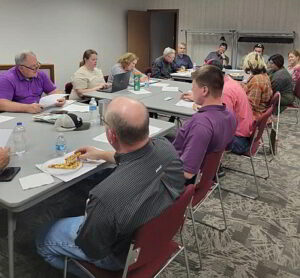
 A pilot program intended to strengthen housing in rural communities recently launched its second year. NCRPC is administering the program — called the NCRPC Housing Initiative — through a partnership with the
A pilot program intended to strengthen housing in rural communities recently launched its second year. NCRPC is administering the program — called the NCRPC Housing Initiative — through a partnership with the  Financial incentives offered through the Washington County Home Ownership Pilot Program assisted in the purchase of 10 homes in the county from June to December 2022.
Financial incentives offered through the Washington County Home Ownership Pilot Program assisted in the purchase of 10 homes in the county from June to December 2022.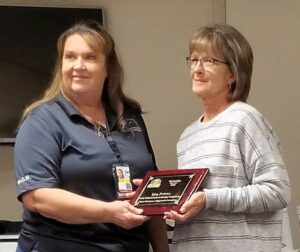
 NCRPC is now hosting free, virtual training courses covering a wide range of topics. Courses available on the training website include a remote work series and a comprehensive rural grocery training series. In addition, some recorded nonprofit board development trainings that were offered in 2021 and 2022 are also archived on the site.
NCRPC is now hosting free, virtual training courses covering a wide range of topics. Courses available on the training website include a remote work series and a comprehensive rural grocery training series. In addition, some recorded nonprofit board development trainings that were offered in 2021 and 2022 are also archived on the site. Many State and Federal awards require entities to have a Unique Entity Identifier (UEI) assigned by the Federal System for Award Management website (
Many State and Federal awards require entities to have a Unique Entity Identifier (UEI) assigned by the Federal System for Award Management website (